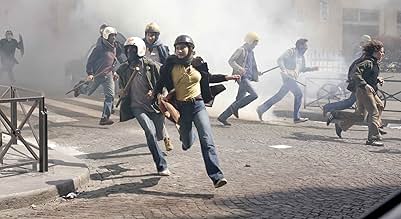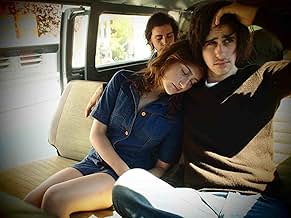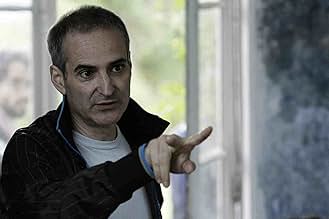Après mai
- 2012
- Tous publics
- 2h 2m
IMDb RATING
6.4/10
4.8K
YOUR RATING
In the months after the heady weeks of May '68, a group of young Europeans search for a way to continue the revolution believed to be just beginning.In the months after the heady weeks of May '68, a group of young Europeans search for a way to continue the revolution believed to be just beginning.In the months after the heady weeks of May '68, a group of young Europeans search for a way to continue the revolution believed to be just beginning.
- Awards
- 5 wins & 4 nominations total
Felix Armand
- Alain
- (as Félix Armand)
Bobbi Salvör Menuez
- Leslie
- (as India Salvor Menuez)
- Director
- Writer
- All cast & crew
- Production, box office & more at IMDbPro
Featured reviews
Gilles is an interesting character, a political activist studying to be an artist. But it's frustrating that beyond his political beliefs we get to know little about him. Conversations are short. What do any of the people feel? There are a lot of opinions and judgments made about society, authority, each other - usual for French films. But left me unsatisfied. Warning: Ironically, be prepared to meet many dissatisfied people, even majorly unhappy ones, during the course of this film. Wonderful evocation of times ('70s) and attention to detail though.
A miniature portrait of the student movement, that focuses around a group of few passionate youngsters.
They do not just want better rights and more acknowledgment; they are prepared to fight in order to get it. It feels the world is at a turning point and so are their lives. If they do not fight for a better world, then what is it all for?
The struggle begins full of zeal, passion and fervour. The time, being unforgiving to all, changes everything. The views of society change, ideals and lives. Through fighting, facing consequences and experimenting with free love and drugs our heroes find themselves facing new realities and challenges. The goal seem to have been achieved, what now? The existential question in everyone's minds.
Though low key, it has enough youthful energy that exhumes passion, inspiration that can stir the audience's thought process expecting from all of us to not lose sight of our ideals, the very thing that makes us human.
They do not just want better rights and more acknowledgment; they are prepared to fight in order to get it. It feels the world is at a turning point and so are their lives. If they do not fight for a better world, then what is it all for?
The struggle begins full of zeal, passion and fervour. The time, being unforgiving to all, changes everything. The views of society change, ideals and lives. Through fighting, facing consequences and experimenting with free love and drugs our heroes find themselves facing new realities and challenges. The goal seem to have been achieved, what now? The existential question in everyone's minds.
Though low key, it has enough youthful energy that exhumes passion, inspiration that can stir the audience's thought process expecting from all of us to not lose sight of our ideals, the very thing that makes us human.
In 1968 in Paris, France, the something in the air was revolution. In March of that year, a single spark began a revolt when a small group of students at Nanterre University took to the streets to protest conditions at the University. By July, workers had shut down Paris with a general strike in which ten million workers took part, occupying factories and marching in solidarity with students, who occupied the Sorbonne. The objectives were self-management by workers, a decentralization of economic and political power and participatory democracy in the factories and universities. By the end of July, the government of the autocratic Charles de Gaulle was teetering on the brink of collapse.
The impact of the 1968 near revolution is still being felt three years later in February, 1971 when Olivier Assayas' semi-autobiographical Something in the Air opens. A demonstration is held at the Place de Clichy in Paris as a teacher in a high school class reads a passage from Pascal, "Between us and Heaven or Hell there is only life, which is the frailest thing in the world." At the same time, the brutal police repression of a young protester, Richard Deshayes, takes place in nearby streets demonstrating the immediacy of Pascal's words. Deshaves loses an eye after being hit in the face by a smoke grenade, and the poster of his bloody head is shown as a symbol of resistance throughout the film.
Something in the Air is about coming-of-age and the awakening of conscience, and Assayas has the courage to remind us of the need to align our actions in life with our beliefs and conscience. Events are shown from the perspective of Gilles (Clément Métayer), a 17-year-old high school student who is a prospective filmmaker, painter of considerable talent as well as a political activist. Gilles and his friends Alain (Felix Armand) and Jean-Pierre (Hugo Conzelmann) are activists in the political arena, working to create a better society. They distribute leaflets, contribute articles to left-wing magazines, and spray paint graffiti slogans on the walls. After a security guard is seriously injured by a Molotov cocktail thrown by one of the protesters, however, Gilles and his new girlfriend Christine (Lola Creton) leave the country for Italy.
On the trip with a group of activist filmmakers, Gilles is told that he can only borrow a camera only if he does agitprop because "we don't do fiction." At a showing of a revolutionary film, a discussion follows about whether to use conventional style or "revolutionary syntax" to get their message across. Although the film is about ideas, we never know exactly which of the student activists are Anarchists, Trotskyites, Maoists, Marxists, Stalinists, or democratic Socialists, but it hardly seems to matter. What makes the film so unique is not only a script that is highly literate but its portrayal of young people with respect for their minds and an appreciation of their dignity and commitment, attributes normally not seen in films about the counterculture. Author Anne Morris said, "The irony of commitment is that it's deeply liberating – in work, in play, in love."
Assayas correctly notes that, in addition to advocating political and economic change, the protesters also want to change outmoded social conventions, particularly the stranglehold of the scientific/materialist paradigm and the puritan sexual mores that place barriers on spiritual growth and full self-expression. What comes across as special, even more than ideas about filmmaking or political theory, are the relationships they have with each other that express their openness and love. The film also blends idealism with music in a way that the songs of Syd Barrett-era, Booker T & the MG's, Nick Drake, and an inspiring rendition of a Phil Ochs song by Johnny Flynn feel organic to the scenes in which they are used.
When the students ultimately gain a sense that life is governed by practicality as well as idealism, they gradually drift away to parents, jobs, school and the careers that will shape their lives, but they have already made a difference. Though their immediate objectives were only partially met, later in the year, uprisings began in Poland and Czechoslovakia that would have a profound effect on the Soviet system, protesters marched at the Democratic Convention in Chicago, rioted at Kent State, and the brutal war against a small, peasant country came to an end several years later.
Though the film is more about personal goals and ambitions than revolution and Assayas does not shed much light on the causes that the students fought for, no film in recent memory has presented such an authentic view of the immediacy of the period as Something in the Air. The feeling of change is electric and its mood is brilliantly reflected by the film's lack of cynicism and condescension. Assayas brings us back to a time when everything seemed possible and people were truly young because the world, maybe for the first time, began to dream of what it would be like to be young with them.
The impact of the 1968 near revolution is still being felt three years later in February, 1971 when Olivier Assayas' semi-autobiographical Something in the Air opens. A demonstration is held at the Place de Clichy in Paris as a teacher in a high school class reads a passage from Pascal, "Between us and Heaven or Hell there is only life, which is the frailest thing in the world." At the same time, the brutal police repression of a young protester, Richard Deshayes, takes place in nearby streets demonstrating the immediacy of Pascal's words. Deshaves loses an eye after being hit in the face by a smoke grenade, and the poster of his bloody head is shown as a symbol of resistance throughout the film.
Something in the Air is about coming-of-age and the awakening of conscience, and Assayas has the courage to remind us of the need to align our actions in life with our beliefs and conscience. Events are shown from the perspective of Gilles (Clément Métayer), a 17-year-old high school student who is a prospective filmmaker, painter of considerable talent as well as a political activist. Gilles and his friends Alain (Felix Armand) and Jean-Pierre (Hugo Conzelmann) are activists in the political arena, working to create a better society. They distribute leaflets, contribute articles to left-wing magazines, and spray paint graffiti slogans on the walls. After a security guard is seriously injured by a Molotov cocktail thrown by one of the protesters, however, Gilles and his new girlfriend Christine (Lola Creton) leave the country for Italy.
On the trip with a group of activist filmmakers, Gilles is told that he can only borrow a camera only if he does agitprop because "we don't do fiction." At a showing of a revolutionary film, a discussion follows about whether to use conventional style or "revolutionary syntax" to get their message across. Although the film is about ideas, we never know exactly which of the student activists are Anarchists, Trotskyites, Maoists, Marxists, Stalinists, or democratic Socialists, but it hardly seems to matter. What makes the film so unique is not only a script that is highly literate but its portrayal of young people with respect for their minds and an appreciation of their dignity and commitment, attributes normally not seen in films about the counterculture. Author Anne Morris said, "The irony of commitment is that it's deeply liberating – in work, in play, in love."
Assayas correctly notes that, in addition to advocating political and economic change, the protesters also want to change outmoded social conventions, particularly the stranglehold of the scientific/materialist paradigm and the puritan sexual mores that place barriers on spiritual growth and full self-expression. What comes across as special, even more than ideas about filmmaking or political theory, are the relationships they have with each other that express their openness and love. The film also blends idealism with music in a way that the songs of Syd Barrett-era, Booker T & the MG's, Nick Drake, and an inspiring rendition of a Phil Ochs song by Johnny Flynn feel organic to the scenes in which they are used.
When the students ultimately gain a sense that life is governed by practicality as well as idealism, they gradually drift away to parents, jobs, school and the careers that will shape their lives, but they have already made a difference. Though their immediate objectives were only partially met, later in the year, uprisings began in Poland and Czechoslovakia that would have a profound effect on the Soviet system, protesters marched at the Democratic Convention in Chicago, rioted at Kent State, and the brutal war against a small, peasant country came to an end several years later.
Though the film is more about personal goals and ambitions than revolution and Assayas does not shed much light on the causes that the students fought for, no film in recent memory has presented such an authentic view of the immediacy of the period as Something in the Air. The feeling of change is electric and its mood is brilliantly reflected by the film's lack of cynicism and condescension. Assayas brings us back to a time when everything seemed possible and people were truly young because the world, maybe for the first time, began to dream of what it would be like to be young with them.
Great movie that does put you in the shoes of those 60 and 70's idealists and lets us contemplate the beauty of their existence, and I mean the kind of movie like Melancholia, which makes you feel things from such a different perspective. The movie does not deal directly with contemporary contradictions of idealism, but it is undeniable that this issue awakens in us when witnessing the characters strife for integrity. It somewhat scented like Spike Lee way of proposing a theme for me. It weaves some plots which are left in low key, just to draw our attention to what really matters for the narrator. We are dealing naive yet sophisticated people - which is the beautiful paradox of their being. I must say that I didn't like a pair of choices like that insertion of Laura when Gille is reading her letter in the subway. For me it breaks the harmony, it is kind of out of the blue solution - though it has its coherence, and, again reminds me of Spike Lee's Jungle Fever.
An experimental coming of age drama that has a good story to tell, but lacks a narrative. Director Olivier Assayas undoubtedly has talent (Carlos), but this film is definitely a misstep in his career.
"Apres Mai", french for after may. Set after the May 68 riots and their immediate aftermath. Students keep protesting and then partying, sometimes they're complaining about how unjust everything is for them and other times they're in Italy getting high.
It starts out good with fast paced editing, a moving soundtrack, great cinematography and a couple of rebel students that made me feel like it was going to be something similar to "Carlos". The movie lost its direction after the first 30 minutes or so and wandered onto other less interesting themes like the hippie culture.
I'd recommend it to people who liked movies similar to "Not Fade Away", "The Dreamers", or "Summer Hours".
"Apres Mai", french for after may. Set after the May 68 riots and their immediate aftermath. Students keep protesting and then partying, sometimes they're complaining about how unjust everything is for them and other times they're in Italy getting high.
It starts out good with fast paced editing, a moving soundtrack, great cinematography and a couple of rebel students that made me feel like it was going to be something similar to "Carlos". The movie lost its direction after the first 30 minutes or so and wandered onto other less interesting themes like the hippie culture.
I'd recommend it to people who liked movies similar to "Not Fade Away", "The Dreamers", or "Summer Hours".
Did you know
- TriviaWith the exception of Lola Créton, the actors portraying the youths were inexperienced, mostly first-time actors found through director Olivier Assayas and casting director Antoinette Boulat having flyers handed out in front of high schools and having set up a casting Facebook page. They did audition other experienced young actors, but only Créton was selected.
- ConnectionsFeatured in At the Movies: Venice Film Festival 2012 (2012)
- How long is Something in the Air?Powered by Alexa
Details
- Release date
- Country of origin
- Official sites
- Languages
- Also known as
- Something in the Air
- Filming locations
- Brunoy, Essonne, France(High School: Lycee Talma)
- Production companies
- See more company credits at IMDbPro
Box office
- Budget
- €5,400,000 (estimated)
- Gross US & Canada
- $85,154
- Opening weekend US & Canada
- $13,288
- May 5, 2013
- Gross worldwide
- $1,305,473
- Runtime
- 2h 2m(122 min)
- Color
- Sound mix
- Aspect ratio
- 1.85 : 1
Contribute to this page
Suggest an edit or add missing content














